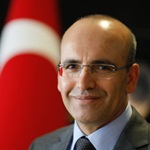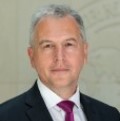|
Location: Cedar Hall, HQ1-1-660
![]() Click here for the photos
Click here for the photos
OVERVIEW
EUR Director Alfred Kammer and Turkish Minister of Treasury and Finance Mehmet Şimşek will engage in a dialogue to discuss Türkiye’s economic stabilization efforts since mid-2023. The significant tightening of the policy mix has substantially reduced Türkiye’s vulnerabilities. However, inflation inertia continues to be difficult to break, and vital spending for earthquake recovery has pushed fiscal deficits up. This session will delve into how these policy changes are reshaping Türkiye’s economic landscape, and how the Turkish authorities are planning to address remaining challenges in their quest to ensure high growth with low and stable inflation.
REPORT
Key Points:
Inflation: bringing inflation back to the target and ensuring price stability is the topmost priority for Türkiye, which is the central bank’s mandate. For this, monetary policy normalization is underway along with the simplification of the macroprudential policies to enable the proper functioning of the market.
Restoring fiscal health: historically, Türkiye has done well when it comes to fiscal health. It has a low fiscal deficit and debt-to-gdp ratio as compared to emerging markets. At this point, a tight fiscal stance is needed to build buffers against unexpected shocks (such as last year’s earthquake) and to support the central bank in the disinflation effort. This also helps to create the fiscal space for important reforms.
Structural transformation: One aspect of this transformation is a new industrial policy, which entails a transparent, rules-based policy unlike the previous models based on import substitution. The focus would be on channeling resources towards more productive sectors, reducing the carbon footprint, to increase competitiveness and enhancing the growth potential.
Quotes:
“A combination of sound policies and a good narrative in the form of structural reforms tends to help regain investor confidence. I think we have regained international investor confidence that is reflected in a significant decline in country default spread… but we need time to show results and to convince the broader society” Mehmet Şimşek
“Geoeconomic fragmentation is putting pressure on the rules-based system… with spillovers for many countries as a result of the uncertainty. I am optimistic that we learn and move on. Even in today’s bigger picture – at the G20 level – we all argue that trade fragmentation and protectionism is not in anyone’s interest and the slow down in trade is one of the major contributors of stagnant growth. The world needs to go back to a new order – hopefully a rules-based order – more just and inclusive order. “ Mehmet Şimşek
Blurb:
In light of Türkiye’s economic stabilization efforts since mid-2023, what are the current challenges facing Türkiye’s economy in the global context? Which policy options have worked, and which haven’t? How have the policies helped change the investment outlook for the country? What are the key macroeconomic risks and is Türkiye prepared to deal with the repercussions of current geopolitical tensions ?
Contributor: Zahir Sakhi
SPEAKER

Mehmet Şimşek
Türkiye’s Minister of Treasury and Finance
Mehmet Simsek served as the Deputy Prime Minister for Economic and Financial Affairs of Türkiye during 2015-2018. He previously served as the Minister of Finance (2009-15), and as the Minister of Economy (2007-09). He was elected to the Parliament for three terms (2007, 2011, 2015) representing the ruling AK Party.
Mr. Simsek has formulated the fiscal policy which has helped Türkiye recover strongly from the global financial crisis. He has also undertaken far reaching reforms such as simplifying tax regulations, enhancing taxpayers’ rights, and reducing the size of shadow economy.
During his 11 years of public service as a minister, Mr. Simsek was a strong advocate of structural reforms and prudent macroeconomic policies. The country’s strong fiscal position and reform efforts have helped Türkiye weather multiple (domestic and external) shocks over the past decade. A credit guarantee scheme, enhanced under Mr. Simsek’s leadership, helped the country avoid a recession after the failed coup attempt in 2016. Mr. Simsek represented Türkiye as a governor at the IMF, the World Bank Group and the IsDB and as the Finance Minister of Türkiye at the G20. He has regularly attended several international forums including the World Economic Forum in Davos, and the Bilderberg Group meetings.
Before entering politics, he worked for Merrill Lynch in London for seven years, initially as economist and strategist, and later as the head of Fixed Income Strategy and Macro Economic Research for the emerging EMEA region (2005-2007). From 1998 to 2000, he was a senior economist and bank analyst at Deutsche-Bender Securities in Istanbul. Earlier in his career, he worked on Wall Street for UBS Securities in New York (1997-1998), and as a senior economist at the US Embassy in Ankara (1993-97).
Mr. Simsek holds a B.S. in Economics from Ankara University and worked as a research assistant in the University’s International Economics and Economic Development Department. He also studied in United Kingdom after being awarded a competitive Turkish State Scholarship. He holds an M.PHil in Finance and Investments from Exeter University. Mr. Simsek is also a member of the Global Economic Symposium (GES) advisory board.
MODERATOR

Alfred Kammer
Director of the European Department
IMF
Alfred Kammer is the Director of the European Department at the International Monetary Fund since August 2020. In this capacity, he oversees the IMF’s work with Europe.
Mr. Kammer was previously the Chief of Staff of the Office of the Managing Director, advising the Managing Director on strategic and operational issues and overseeing operations for the senior management team; Deputy Director of the Strategy, Policy and Review Department, overseeing the work on Fund strategy and surveillance policy; Deputy Director of the Middle East and Central Asia Department, overseeing regional economic developments and financial sector issues; Director of the Office of Technical Assistance Management, advising management on technical assistance operations and overseeing fundraising and global partnerships for capacity building; and Advisor to the Deputy Managing Director. Mr. Kammer also served as resident representative of the IMF in Russia. Since joining the IMF, Mr. Kammer worked with countries in Africa, Asia, Europe, and the Middle East, and on a wide range of policy and strategic issues.